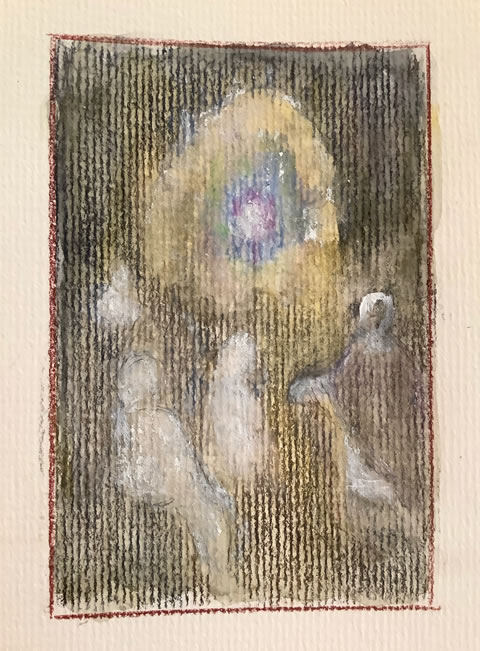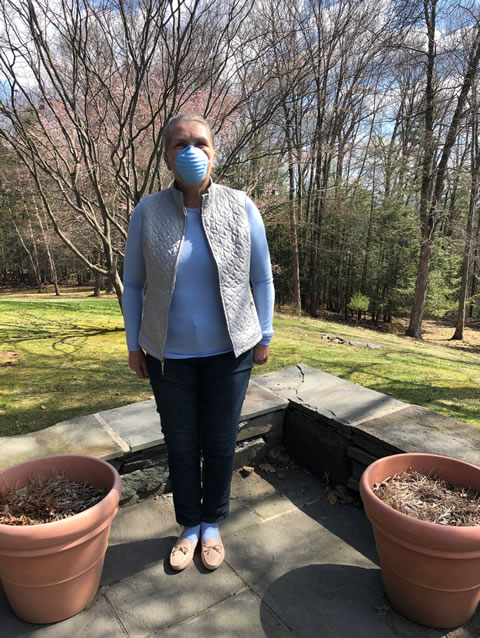Today is April 11, Holy Saturday in the church calendar. Passover began at sunset on Wednesday. My editor and her husband had their first Zoom Seder “with family from Copenhagen, Toronto, California, Minnesota, Chicago, and Brooklyn.” Her husband made matzo at home “because we couldn’t find any…I made the perforations” Her photo of their Matzo looked like a piece of papyrus with tiny hieroglyphics.
On Maundy Thursday this year, Queen Elizabeth had to forego her favorite face-to-face presentation of the Royal Maundy coins to the pensioners in St. George chapel. These are selected old people who have done service in their communities or churches. This year there were 94 pensioners, one for each year of the Queen’s life.This year because of the virus they received them by mail with a personal note. One of them was the 101-year-old bell-ringer Thomas Brock, who began his ringing service at the age of seven.
The first time I took Robert with me to a Maundy Thursday church service, he was overcome by the stripping of the altar. Everything removed, piece by piece, all the familiar trappings: holy vessels, embroidered coverings, even the candlesticks, followed by the scrape-scrape of hyssop branches washing down the bare wood of the altar.
“I loved that service,” he told me afterwards,“everything being taken away!”
I loved it, too, unable to say exactly why until many years later. Robert’s attraction was easier to understand. Everything taken away when he was a boy of fourteen in Vienna. All family and furnishings. Starting over all by himself in Palestine. Sometimes I have to wait until a character I have invented tells me something I haven’t been able to figure out for myself.
“Everything is going, going, gone,” is how Blanche Buttner describes her beloved Maundy Thursday. “…and then we have to submit to the darkness and desolation in between. For me, the desolation has always been my high point. To fully grasp the magnitude of what you’ve lost requires the experience of having to do without it.”
(In Old Lovegood Girls, Blanche has been engaged to Uncle Rowan for twenty-five years.)
Reparation in the Crypt
This is the crypt of St. Mary’s Parish in Asheville, N.C. on Maundy

Thursday where, as an adult on visits home, I always signed up for a Watch at the Altar of Repose. I am the figure sitting at the back. On the right on his knees is Father Edward. In front are other watchers who have signed up for the hour. The sacrament in its tabernacle must not be left alone until it is carried back upstairs on Good Friday to its place on the main altar.
The Watch is in reparation for the disciples abandoning Jesus (“Could ye not watch with me one hour?) in his hour of agony. We are also meant to make our own mental reparations, to cleanse and restore those things in ourselves that have been neglected or damaged.
During those watches, I never failed to recall how, as Girl Scouts who had once met in this crypt, my friend Stuart and I decided to practice for a fundraiser. We had settled on a strip tease and were proceeding apace in our undress-rehearsal until some shocked adult intervened.

I have been performing a sort of reparation today in the quiet of my Plague Watch. What have I done or left undone? What is still damaged in me? Since the election in 2016, I have become extra-alert to my sins. I have even tried to give up telling lies.
Yesterday, on Good Friday, I asked Jolanta, who manages this house,
“What did you do during Holy Week? I mean, when you were growing up, the communists were running your country, weren’t they?”
“Yes, but the Catholic Church in Poland was VERY STRONG. We did everything we wanted. We made these beautiful Easter baskets. On Easter we filled them with colored eggs and tiny pieces of everything we planned to eat, little pieces of ham and bread, and we made—out of sugar–these little lambs that we put on top. Then we took them to the church and the priest blessed the baskets with holy water.”
Above is Jolanta on Good Friday in her coronavirus garb. Note the matching blues.
End